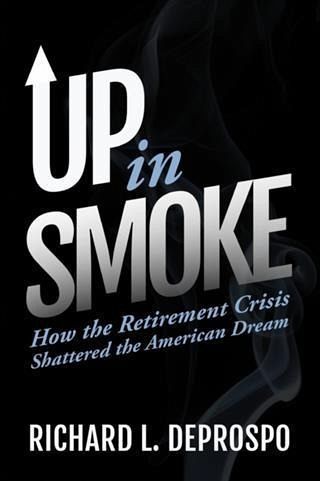
Up in Smoke (eBook, ePUB)
How the Retirement Crisis Shattered the American Dream

PAYBACK Punkte
12 °P sammeln!
The U.S. Census Bureau estimates there are currently forty million Americans aged sixty-five and over. With the first of the Baby Boom generation reaching the traditional retirement age of sixty-five in 2011, the number of retirement age individuals is expected to grow by 10,000 each day for the next fifteen years. By 2030, when the last of the Baby Boomers will have turned sixty-five, an estimated 18% of the US population, or sixty-five million Americans, will have reached retirement age. Half of these people will live out their final years in poverty, the result of under-planning, under-savi...
The U.S. Census Bureau estimates there are currently forty million Americans aged sixty-five and over. With the first of the Baby Boom generation reaching the traditional retirement age of sixty-five in 2011, the number of retirement age individuals is expected to grow by 10,000 each day for the next fifteen years. By 2030, when the last of the Baby Boomers will have turned sixty-five, an estimated 18% of the US population, or sixty-five million Americans, will have reached retirement age. Half of these people will live out their final years in poverty, the result of under-planning, under-saving and the victims of a reckless and misguided experiment in defined contribution retirement plans.
The shift in the private sector from employer-sponsored defined benefit plans to employee-based defined contribution plans, or 401(k)s, a process that took hold rather abruptly in the early 1980s, has left fewer than one in five private sector workers covered by a traditional retirement plan. As a consequence, only fourteen percent of Americans indicate they are confident they will be prepared for the expenses of retirement.
Authorized by Congress under the Revenue Act of 1978, IRAs and 401(k)s as we have now come to learn, were not particularly well thought out. The economic model that established limits on annual contributions and relied upon individual diligence, expert investment management and a healthy measure of luck, had very little chance of success.
Amidst this backdrop of limited retirement savings, public sector employee pension plans are deeply troubled. The unfunded portion of U.S. state and local government pension obligations currently exceeds $4 trillion. This ever-growing pension liability threatens the solvency of local governments from coast to coast, as well as the pension benefits promised to public sector employees.
Up In Smoke provides a startling examination of our nation's retirement funding: social security, corporate defined benefit programs, local government employee pension plans and 401(k), IRA and other defined contribution plans. Each of these programs is tragically underfunded, at a time when demographics are forcing a tidal wave of Americans into retirement. These individuals, as well as generations to follow will increasingly be seeking an understanding of how we arrived at this desperate place and just what hope might lie ahead. Up In Smoke provides those insights.
The shift in the private sector from employer-sponsored defined benefit plans to employee-based defined contribution plans, or 401(k)s, a process that took hold rather abruptly in the early 1980s, has left fewer than one in five private sector workers covered by a traditional retirement plan. As a consequence, only fourteen percent of Americans indicate they are confident they will be prepared for the expenses of retirement.
Authorized by Congress under the Revenue Act of 1978, IRAs and 401(k)s as we have now come to learn, were not particularly well thought out. The economic model that established limits on annual contributions and relied upon individual diligence, expert investment management and a healthy measure of luck, had very little chance of success.
Amidst this backdrop of limited retirement savings, public sector employee pension plans are deeply troubled. The unfunded portion of U.S. state and local government pension obligations currently exceeds $4 trillion. This ever-growing pension liability threatens the solvency of local governments from coast to coast, as well as the pension benefits promised to public sector employees.
Up In Smoke provides a startling examination of our nation's retirement funding: social security, corporate defined benefit programs, local government employee pension plans and 401(k), IRA and other defined contribution plans. Each of these programs is tragically underfunded, at a time when demographics are forcing a tidal wave of Americans into retirement. These individuals, as well as generations to follow will increasingly be seeking an understanding of how we arrived at this desperate place and just what hope might lie ahead. Up In Smoke provides those insights.
Dieser Download kann aus rechtlichen Gründen nur mit Rechnungsadresse in A, B, BG, CY, CZ, D, DK, EW, E, FIN, F, GR, HR, H, IRL, I, LT, L, LR, M, NL, PL, P, R, S, SLO, SK ausgeliefert werden.













